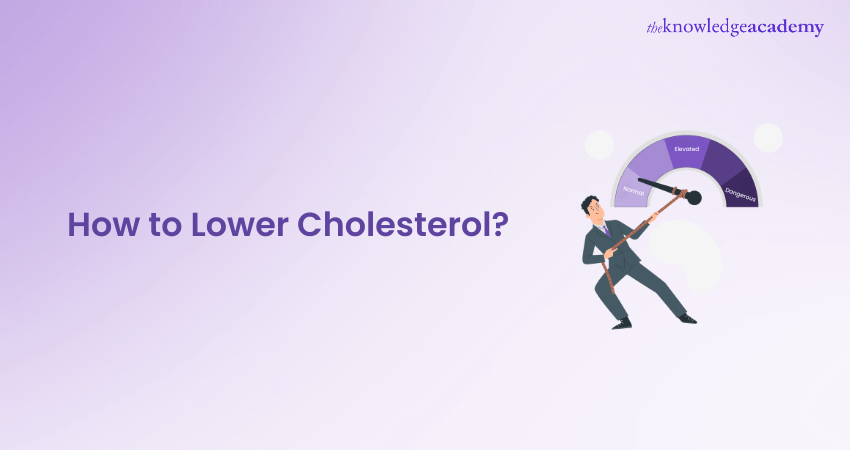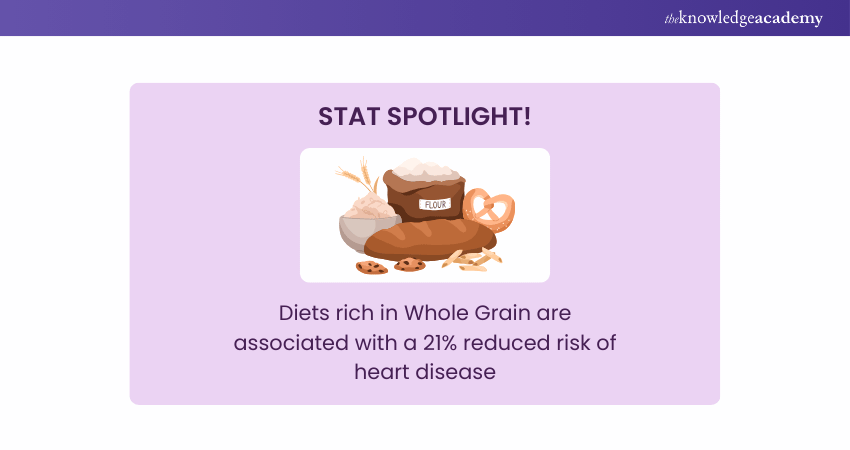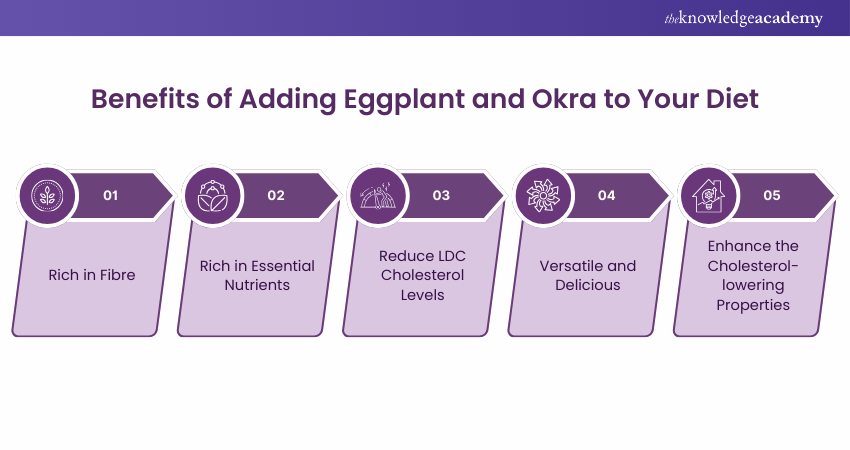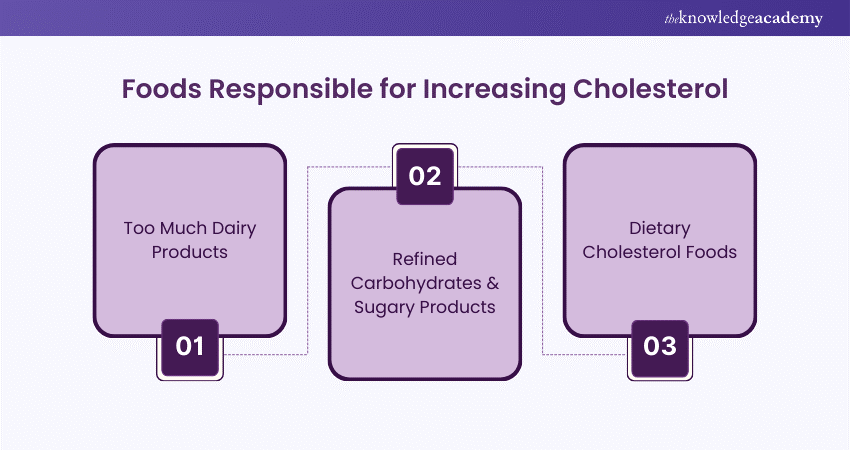We may not have the course you’re looking for. If you enquire or give us a call on 01344203999 and speak to our training experts, we may still be able to help with your training requirements.
Training Outcomes Within Your Budget!
We ensure quality, budget-alignment, and timely delivery by our expert instructors.

We’ve all heard about cholesterol and its impact on heart health, but did you know that it’s actually something you can take control of? If your cholesterol levels are on the higher side, don’t panic! There are simple, everyday changes you can make to bring those numbers down and keep your heart in tip-top shape.
Whether it’s swapping a few foods, adding more movement into your day, or even tweaking some lifestyle habits, lowering cholesterol is all about making smarter choices. In this blog, we’ll dive into easy, proven ways on How to Lower Cholesterol—without the stress. Let’s get your heart feeling great again!
Table of Contents
1) Incorporate Heart-Healthy Foods
2) Include Barley and Whole Grains
3) Stay Active with Regular Exercise
4) Add Eggplant and Okra to Your Diet
5) Focus on Healthy Weight Loss
6) Snack on Nuts for Better Cholesterol
7) Limit Alcohol Consumption to Moderate Levels
8) Use Vegetable Oils Instead of Saturated Fats
9) Include Soy-Based Products
10) Add Fatty Fish for Omega-3 Benefits
11) Foods Responsible for Increasing Cholesterol
12) Conclusion
Incorporate Heart-Healthy Foods
Making a few changes to your diet can help reduce Cholesterol and improve heart health. Here are some tips:
1) Cut Back on Saturated Fats
Saturated fats are a major contributor to high cholesterol levels.
a) Sources: Red meat, full-fat dairy products, and processed foods.
b) Health impact: Excess saturated fat raises blood cholesterol, increasing the risk of heart disease and stroke.
c) Action: Opt for lean cuts of meat, switch to low-fat or non-fat dairy products, and limit processed food intake.
2) Avoid Trans Fats
Trans fats are harmful fats that should be avoided for heart health.
a) Sources: Margarine, store-bought baked goods, cookies, crackers, and fried foods.
b) Health impact: Trans fats raise unhealthy LDL cholesterol and lower beneficial HDL cholesterol, worsening heart health.
c) Action: Check food labels for "partially hydrogenated vegetable oil" and choose products free from trans fats.
3) Incorporate Omega-3 Fatty Acids
Omega-3s provide heart-healthy benefits, even though they don't directly lower LDL cholesterol.
a) Sources: Fatty fish (salmon, mackerel, herring), walnuts, flaxseeds, and chia seeds.
b) Health impact: Omega-3s help reduce blood pressure, improve heart rhythm, and reduce inflammation.
c) Action: Aim to include Omega-3-rich foods in your diet several times a week for optimal heart health.
4) Increase Soluble Fibre
Soluble fibre can help lower cholesterol by reducing its absorption into the bloodstream.
a) Sources: Oatmeal, Brussels sprouts, apples, pears, beans, and lentils.
b) Health impact: Soluble fibre helps reduce LDL cholesterol levels and improves overall digestive health.
c) Action: Add fibre-rich foods to your daily meals to support healthy cholesterol levels.
Include Barley and Whole Grains
Incorporating barley and other whole grains into your diet can significantly enhance heart health. This is due to their high soluble fibre content, which offers numerous benefits. Here are some key points to consider:

1) Soluble Fibre Benefits: Soluble fibre binds to Cholesterol in the digestive system, preventing its absorption into the bloodstream. This process can lower LDL Cholesterol by 5-10% with just 3 grams daily.
2) Nutrient-Rich: Whole grains provide essential nutrients like B vitamins, magnesium, and antioxidants. These nutrients help in supporting cardiovascular health and contribute to overall well-being.
3) Weight Management: Whole grains help you in feeling full, aiding in weight management. Maintaining a healthy weight is important for controlling Cholesterol levels and reducing the heart disease risk.
4) Versatile and Delicious: Barley can be easily added to soups, salads or used as a side dish. Other whole grains like brown rice, quinoa, and bulgur offer similar benefits and can be great alternatives or additions to your diet.
Stay Active with Regular Exercise
One of the most promising ways to keep one’s cholesterol in check involves engaging onself in regular exercise and physical activities. Engaging in moderate to intense activity raises High-density Lipoprotein (HDL) Cholesterol, the "good" Cholesterol. One should regularly exercise for 30 minutes five times/week or 20minutes of intensive exercise with doctor’s approval.
Alongside, you must also add physical exercises to your daily diet, even in short intervals throughout the day, which can also help you lose weight easily. Here are some ideas to get you moving:
1) Take A Brisk Daily Walk: Use your lunch hour to get some fresh air and exercise.
2) Ride Your Bike To Work: This can be an eco-friendly way to incorporate exercise into your daily routine.
3) Play a Favourite Sport: Engaging in sports you enjoy can make exercise feel less like a daily cup of tea.
Become a certified Food Safety Manager with our Food Safety Manager Training- Sign up today!
Add Eggplant and Okra to Your Diet
Eggplant and okra are excellent additions to a heart-healthy diet due to their high soluble fibre content. Here are some key points to consider:

1) Rich in Fibre: Soluble fibre in eggplant and okra helps reduce Cholesterol levels by binding with Cholesterol particles in the digestive tract.
2) Rich in Essential Nutrients: Both vegetables are rich in Vitamins, Minerals, And Antioxidants. Eggplant contains Nasunin, an antioxidant that can protect cells from oxidative damage, while okra contains mucilage, enhancing its Cholesterol-lowering effects.
3) Reduce LDC Cholesterol Levels: Regular consumption of okra can reduce LDL Cholesterol levels and support better blood sugar regulation, which is good for individuals with diabetes or at risk for heart disease.
4) Versatile and Delicious: Eggplant can be grilled, roasted, or used in dishes like ratatouille and baba ganoush. Okra can be enjoyed in soups, stews, or sautéed as a side dish.
5) Enhance the Cholesterol-lowering Properties: Pairing eggplant and okra with other soluble fibre-rich foods, such as oats, barley, or beans, can enhance their Cholesterol-lowering properties and contribute to a balanced, heart-friendly diet.
Focus on Healthy Weight Loss
Carrying even extra weight can contribute to high Cholesterol. Small changes can make a big difference. Here are some tips to help:
1) Switch to Water: If you drink sugary beverages, switch to tap water to reduce calorie intake.
2) Healthy Snacks: Snack on air-popped popcorn or pretzels, but keep track of the calories. If you crave something sweeter, try sherbet or low-fat candies like jellybeans.
3) Increase Daily Activity: Incorporate more activity into your routine, such as using the stairs or parking farther from your office.
4) Take Walks: Take walks during breaks at work to stay active and boost your metabolism.
Snack on Nuts for Better Cholesterol
Eating nuts like almonds, walnuts, and peanuts is great for heart health. Here are some key points to consider:
1) Lower LDL Cholesterol: Consuming 2 ounces of nuts daily can lower LDL Cholesterol by about 5%.
2) Nutrient-Rich: Nuts contain additional nutrients that protect the heart in various ways, contributing to overall cardiovascular health.
Gain essential allergy awareness skills for food safety- Join our Food Allergy Awareness Training now!
Limit Alcohol Consumption to Moderate Levels
Alcohol consumption in a limited amount has been linked to higher HDL Cholesterol levels, but the benefits aren't strong enough to recommend alcohol for non-drinkers. Here are some key points to consider:
1) Moderation is Key: For healthy adults, moderation means up to one drink a day for women of all ages and men older than 65 and up to two drinks a day for men 65 and younger.
2) Health Risks of Excessive Drinking: Too much alcohol can lead to serious health problems, such as high blood pressure, heart failure, and strokes.
Use Vegetable Oils Instead of Saturated Fats
Switching to liquid vegetable oils like canola, sunflower, and safflower instead of butter, lard, or shortening can help lower LDL (bad) Cholesterol. These oils are healthier options for cooking and can contribute to better heart health. Here are some key points to consider:
1) Healthier Cooking Options: Using liquid vegetable oils such as canola, sunflower, and safflower instead of butter, lard, or shortening can help lower LDL Cholesterol.
2) Heart Health Benefits: These oils are healthier options for cooking and can contribute to better heart health by reducing bad Cholesterol levels.
Include Soy-Based Products
Eating soybeans and foods made from them can help lower Cholesterol, though the effect is modest. Here are some key points to consider:
1) Modest Cholesterol Reduction: Consuming 25 grams of soy protein a day (equivalent to 2 1/2 cups of soy milk) can lower LDL Cholesterol by 5% - 6%.
2) Incorporating Soy: Eating soy-based foods can contribute to overall heart health, even if the Cholesterol-lowering effect is modest.
Add Fatty Fish for Omega-3 Benefits
Eating fish two or three times a week can help lower LDL Cholesterol and improve heart health. Here are some key points to consider:
1) Replace Meat: Fish can replace meat containing LDL-boosting saturated fats, thereby reducing LDL Cholesterol levels.
2) Omega-3 Benefits: Fish delivers omega-3 fats, which lowers LDL Cholesterol and reduces triglycerides in the bloodstream.
3) Heart Protection: Omega-3s also protect the heart from prevent the onset of abnormal heart rhythms.
Foods Responsible for Increasing Cholesterol
Certain foods can worsen high Cholesterol, particularly those high in saturated fat and sugar. Here are some key points to consider:

1) Sources of Saturated Fat: Fatty meats, full-fat dairy products like butter, cream, ghee, palm and coconut oil, and processed foods such as biscuits, cakes, pastries, and chocolate are top sources of saturated fat in our diet.
2) Impact of Sugary Foods and Refined Carbohydrates: Eating too many sugary foods, drinks, and refined carbohydrates can also affect Cholesterol levels. Refined carbohydrates are processed and stripped of their natural fibre, minerals, and vitamins.
3) Dietary Cholesterol: Some foods contain dietary Cholesterol, like eggs, shellfish (prawns and crab), and offal (liver, liver, pate, and kidney). However, they do not significantly impact blood Cholesterol levels and are low in saturated fat, making them fine to eat as part of a healthy diet.
Become a Food Hygiene Expert in manufacturing- Register for our Food Hygiene And Safety in Manufacturing Training now!
Conclusion
In conclusion, maintaining healthy Cholesterol levels is vital for long-term heart health and overall well-being. You can take effective better health steps by embracing lifestyle changes such as eating heart-healthy foods, staying active, and making mindful dietary choices. This blog on How To Lower Cholesterol equips you with insights to make informed decisions. So, begin your journey today and take control of your heart health for a vibrant and healthier future.
Learn vital sanitation practices for food plants- Kickstart your Food Plant Sanitation Training now!
Frequently Asked Questions

To drop Cholesterol fast, focus on a diet rich in soluble fibre from oats, barley, and vegetables like eggplant. Avoid limiting saturated fats found in red meat and full-fat dairy. Engage in regular exercise, aim for healthy weight loss and snack on heart-healthy nuts.

Drinks that reduce Cholesterol include green tea, which is rich in antioxidants that lower LDL Cholesterol, and soy milk, which contains protein that can reduce LDL. Other options are oat-based beverages with soluble fibre and citrus juices like orange juice fortified with sterols, which help block Cholesterol absorption.

The Knowledge Academy takes global learning to new heights, offering over 30,000 online courses across 490+ locations in 220 countries. This expansive reach ensures accessibility and convenience for learners worldwide.
Alongside our diverse Online Course Catalogue, encompassing 19 major categories, we go the extra mile by providing a plethora of free educational Online Resources like News updates, Blogs, videos, webinars, and interview questions. Tailoring learning experiences further, professionals can maximise value with customisable Course Bundles of TKA.

The Knowledge Academy’s Knowledge Pass, a prepaid voucher, adds another layer of flexibility, allowing course bookings over a 12-month period. Join us on a journey where education knows no bounds.

The Knowledge Academy offers various Food Hygiene and Safety Training, including Food Safety and Hygiene Course, Food Safety Manager Training, and Food Plant Sanitation Training. These courses cater to different skill levels, providing comprehensive insights into How Much Protein Do I Need.
Our Health & Safety Blogs cover a range of topics related to Risk Management, offering valuable resources, best practices, and industry insights. Whether you are a beginner or looking to advance your Health & Safety skills, The Knowledge Academy's diverse courses and informative blogs have got you covered.
Upcoming Health & Safety Resources Batches & Dates
Date
 Food Safety and Hygiene Course
Food Safety and Hygiene Course
Fri 7th Mar 2025
Fri 2nd May 2025
Fri 4th Jul 2025
Fri 5th Sep 2025
Fri 7th Nov 2025







 Top Rated Course
Top Rated Course



 If you wish to make any changes to your course, please
If you wish to make any changes to your course, please


